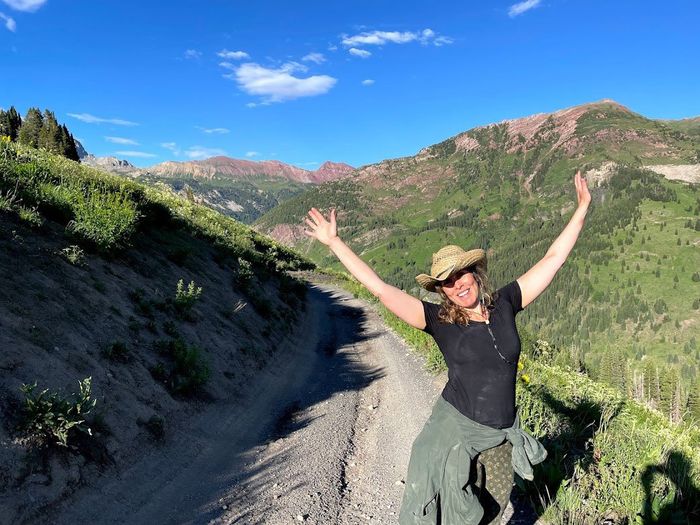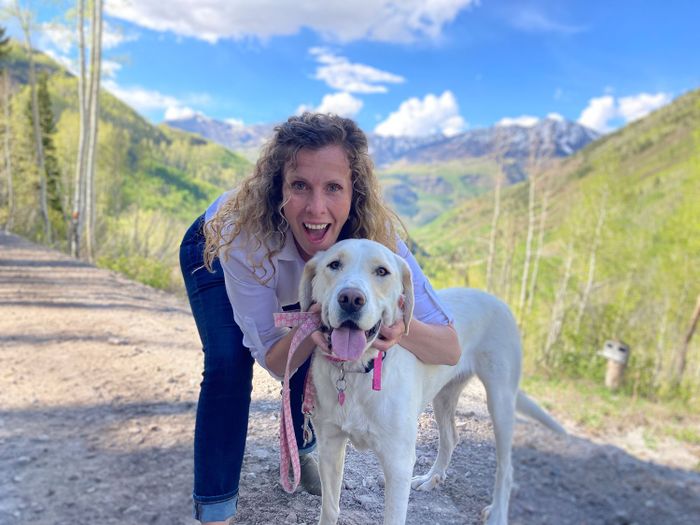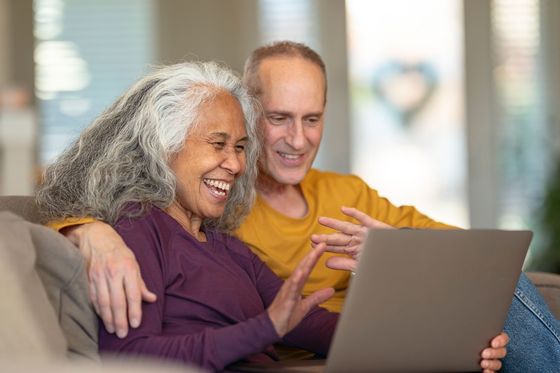About
Thriving with vison loss or visual impairment doesn't happen in isolation.
Working with me can provide a gentle starting place or encouragement to overcome obstacles when you feel stuck or overwhelmed.
Welcome, I'm Erika.
Living with vision loss or visual impairment might be one of the most stressful and vulnerable experiences of your life.
You deserve to have your concerns listened to and to feel understood. That's where healing begins.
Individualized coaching can be a game-changer in helping you transform from distress as your baseline to calm and confidence.
In addition to my professional expertise, my personal experiences with grief, loss, health issues, and caregiving have expanded my compassion, empathy, and respect for the challenges low vision brings; they have made me a companion on the path of inner healing.
Image description: Erika, at a profile, admires the glowing light of dusk in the Moab desert.
I'm honored that individuals experiencing vision loss invite me to journey with them towards healing.
My Story
While volunteering for an AmeriCorps literacy program in Nashville 25 years ago, I learned, that at the time, Vanderbilt University offered a free Braille class for anyone willing to tutor Braille. My AmeriCorps mentor insisted I had to meet Dr. Anne L. Corn, who headed up the program. Sitting in Dr. Corn’s office, where she put her magnifier down atop a scholarly tome and spoke passionately about how low vision impacts children and families, how low vision isn't total blindness but an in-between space in which technical and psychosocial skills make all the difference, I knew I had found my calling.
Although I began my career working with children and families, working with adults became my passion, too. Vision loss in adults challenges personal identity and confidence in a way that requires skill to restore hope. I loved the protected one-on-one time that working as a low vision therapist allowed me. My clients often said that active listening and validation were among the best gifts I gave them. The trust we developed paved the way to solutions and hope.
Throughout my career as a low vision therapist, I've focused on developing expertise in areas where my clients were experiencing the greatest need, such as low vision driving, visual skills, adjustment to visual impairment, and vision loss associated with brain injury.
While providing services in these areas was impactful to individual clients, three barriers continued to be problematic:
- Low vision services were hard to find and not well understood.
- Transportation to access services was challenging.
- Stress from vision loss impacted the benefits of training.
Then, the COVID pandemic normalized Telehealth and highlighted the importance of mental health.
In response, I founded Low Vision Beyond the Clinic to serve people with vision loss and their providers thrive by offering online support to:
- simplify the process of accessing and understanding low vision services,
- use vision better,
- manage vision-specific stress, and
- support low vision providers through an online community offering camaraderie and inspiration.
Join me to experience a unique model of low vision care!


-
Education & Training
- Bachelor's in English Literature and Language Arts Education, University of Central Florida
- Master's in Visual Disabilities, Vanderbilt University
- Certified Low Vision Therapist, Academy for Certification of Vision Rehabilitation & Education Professionals
- Two-year Spirituality and Mindfulness Practices Program, The Living School for Action and Contemplation
- In progress: Traumatic Stress Studies Certificate, Trauma Research Foundation
-
Presentations
- “VA Video Connect Late Adoption.” VA Blind Rehabilitation Service Community of Practice National Call, 2021.
- “Best Practices in Low Vision.” VA Blind Rehabilitation Services National Conference, 2018.
- “Comparing Interventions; CCTV vs. Eccentric Viewing Training.” VA Blind Rehabilitation Services Journal Club, 2018.
- “Providing Vision Rehabilitation Continuum of Care for Patients with Neurological Vision Loss in Inpatient and Outpatient Treatment Settings.” Envision Conference, 2017.
- “Vision and Traumatic Brain Injury.” VA Blind Rehabilitation Services National Conference, 2017.
- “Making Dreaded Conversations Better: Driving Decisions and Older Drivers with Low Vision.” Envision Conference, 2015.
- “Low vision & Driving Best Practices.” VA Blind Rehabilitation Services National Conference, 2015.
- “Bioptic Telescopes for Wheelchair Mobility: A Continuum of Evaluation & Training Tools.” Envision Conference, 2012.
- “Distance Magnification: O&M and Low Vision Therapy Approaches.” Envision Conference, 2012.
-
Writing
- Under contract: D’Andrea, FM & Andersen, E. “Teaching Literacy and the Use of Optical Devices” & Andersen, E. & Rebovich, A. “Low Vision Telehealth.” Foundations of Low Vision, Eds. Zebehazy, Lusk & McCarthy (Anticipated 2023).
- Coy, J & Andersen, E. “Children and the Use of Optical Devices”, Foundations of Low Vision, Eds. Corn & Erin, American Foundation for the Blind Press. (2010).
- Localization training in two patients with advanced glaucoma. International Congress Series. International Congress Series, Volume 1282, September 2005 S.C. Modi, E.A. Andersen.
- Managing patients with multiple sclerosis through a new multidisciplinary program: MS eye center for analysis, research and education. International Congress Series, Volume 1282, September 2005, Pages 257-261 A.M. Perez, E. A. Andersen, S.C. Modi and S.Y. Woo.
- Low vision rehabilitation and driving training for hemianopic visual field loss: two case reports International Congress Series, Volume 1282, September 2005, Pages 664-668 S.C. Modi, S.Y. Woo, E.A. Andersen, C. Strowmatt and A.M. Perez.
- Program in Low Vision Therapy. “Training the Use of Distance Devices”, “Training the Use of Near Devices” Region IV ESC Resource Region IV Education Service Center Houston, Texas (2004).
- Corn, AL; Bell J.K.; Andersen, E.A.; Jose, R.; Bachofer, C. Providing Access to the Visual Environment: A Model of Low Vision Services for Children. Journal of Visual Impairments and Blindness. 97; 5 p. 261-272.
-
Ethos
ethos: "the practices or values that distinguish one person, organization, or society from others."
I believe:
- Learning to manage vision-loss stress is as important as getting the right prescription glasses, adaptive devices, and low vision technology; it's key to feeling like yourself again.
- "What we don't transform, we transmit." Everyone experiences trauma and grief, even if it's not vision loss. It shows up elsewhere when we don't work through our loss and pain. I believe this is true of all humans, and I actively work through my losses and trauma using the same practices that I share with you. I am a companion traveler in the healing journey and seek out trained specialists to help me do inner work.
- Vision loss can potentially impact the body in ways similar to trauma. Body-based (somatic) practices for regulating your nervous systems, such as breathing techniques and gentle movement, can be essential for moving beyond trauma.
- Everyone with low vision benefits from a multidisciplinary vision rehabilitation team, but understanding what this means isn't straightforward. Both medical and educational systems offer essential services. Insurance covers some services, others are out-of-pocket, and some are free, so it's hard to know how to prioritize time and money. I use health navigator services strategies to educate regarding the value of multidisciplinary low vision services and how to access them.
- Life coaching brings a valuable element to low vision rehabilitation by addressing behavioral, emotional, and physical changes. I use life coaching strategies within my low vision therapy services to support successful outcomes.
- All low vision care should be: client-centered and collaborative, equitable and easily accessed, based on the most current science (evidence-based practice) combined with clinical wisdom and compassion, goal-driven (based on what you want to do) versus equipment or technology-driven, and your experience should be respectful and meaningful (hopefully, fun, too!).
- Our medical system needs transformation from an authoritarian, hierarchical, profit-led system to a healing-led, collaborative, inclusive approach that values science, human wisdom, equity, and care for our planet. I am committed to a life-long process of aligning my professional practice and personal life towards more equity for all by participating in systems change at micro levels, starting with myself.
- Ableism and ageism are as wrong as racism and prejudice in all their forms. I seek to dismantle ableism and ageism by identifying biases -- in myself and my spheres of influence, promoting humans' inherent worth, and embracing healthy interdependence and adaptability over independence.
Benefit from experience.
Connect with low vision support from home. Start with a free 15-minute consultation call.
Questions about low vision?

A Holistic Approach to Low Vision
Online support at home
Erika Andersen Ko MEd, CLVT
Certified Low Vision Therapist
Low Vision Beyond the Clinic, LLC.
All rights reserved.
Low Vision Beyond the Clinic, LLC. All rights reserved.

